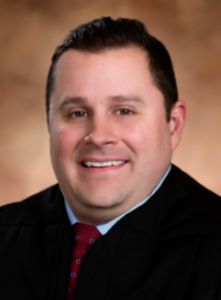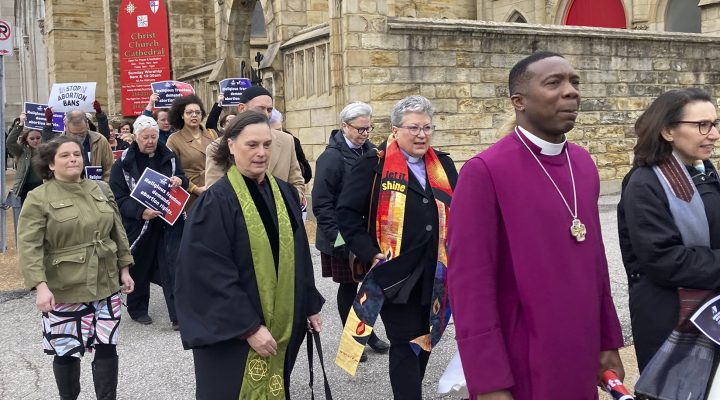More than a dozen faith leaders are urging the Missouri Supreme Court to strike down the state’s near-total abortion ban as a violation of church-state separation.
The plaintiffs in Rev. Traci Blackmon v. State of Missouri recently filed a notice of appeal with the state’s high court appealing St. Louis Circuit Judge Jason Sengheiser’s ruling the ban does not violate the Establishment clause of the Missouri Constitution. The decision blocks the ministers from proceeding in circuit court.

Judge Jason Sengheiser
Attorneys with Americans United for the Separation of Church and State and the National Women’s Law Center argued the ban is unconstitutional because Missouri lawmakers cited religious convictions in enacting it in 2022.
“We’re ready to fight all the way to the Missouri Supreme Court to defend reproductive and religious freedom for all Missourians,” the groups said in a joint statement. “The state’s abortion ban is a direct attack on the separation of church and state, religious freedom and reproductive rights. When lawmakers enacted these laws, they made it clear that they were imposing their personal religious beliefs on the entire state. We remain committed to restoring abortion access in Missouri.”
The 13 plaintiffs include clergy from Baptist, United Church of Christ, Episcopal, United Methodist, Jewish and Unitarian Universalist traditions. Each has said they are compelled by faith to support abortion access due to its contributions to reproductive health, economic security and the equality of women, the statement explains.
“The lawsuit alleges that Missouri’s abortion ban and other restrictions violate the state constitution by enshrining lawmakers’ personal religious beliefs about abortion. … Lawmakers openly and repeatedly emphasized they were writing their religious beliefs into the abortion bans, even declaring in one statute that ‘Almighty God is the author of life’ — a phrase that an opposing lawmaker noted was ‘in violation of the separation of church and state.’”
Video clips provided by AU and the National Women’s Law Center show numerous Republican lawmakers making religious arguments in support of the legislation in 2022.

Adam Shnelting
“The fact of the matter is, I know of no greater way of affirming the natural rights of man than to declare that they are a gift from our Creator that neither man nor government can abridge,” Rep. Adam Shnelting said in response to concerns the bill may violate the church and state.

Holly Thompson Rehder
“God doesn’t give us a choice in this area. He is the creator of life. And I, being made in his image and likeness, don’t get to choose to take that away no matter how that child came to be. To me, life begins at conception,” Sen. Holly Thompson Rehder said.
“As a Catholic, I do believe life begins at conception. That is built into our legislative currently in law,” said Sen. Nick Shroer, the bill’s sponsor.
But Judge Sengheiser cited U.S. and Missouri case law in dismissing the claim the ban is unconstitutional because religious speech was employed in its passage.

Nick Shroer
“The court finds that the individual comments by legislators should be given little to no consideration when determining the constitutional validity of the challenged provisions,” he said in his June 14 decision. “(A court) will not strike down an otherwise constitutional statute on the basis of an alleged illicit legislative motive.”
He added: “‘What motivates one legislator to make a speech about a statute is not necessarily what motivates scores of others to enact it, and the stakes are sufficiently high for us to eschew guesswork.”
In his order, Sengheiser also cited Kennedy v. Bremerton, a 2022 U.S. Supreme Court ruling that the Constitution’s Establishment Clause cannot be used by government to infringe on personal free speech and free exercise rights — in this instance those of a high school assistant football coach penalized for holding on-field, post-football game prayer sessions with athletes that administrators found coercive. Prior precedent held that governments could allow religious behavior only if it had a secular purpose, included no promotion of the behavior and did not result in excessive government immersion in matters of faith.
But the high court in Kennedy found the U.S. Constitution’s Establishment Clause “must be interpreted by reference to historical practices and understandings,’” Sengheiser said in explaining the legal basis of his ruling.
“To begin, the court notes Missouri has had some form of abortion restriction since 1825 and even prior to the adoption of the Missouri Constitution, well before women could vote on the matter. … There are historical statutes criminalizing abortion. In reading those statutes, it appears initially causing an abortion was a misdemeanor, but if the woman died in the process, it was second-degree manslaughter.”
But Americans United said Missouri’s ban, and others like it, are by definition unconstitutional. “Laws banning or restricting abortion access impose one narrow religious belief on everyone bound by those laws, including those whose religions counsel in favor of abortion access.”
Missouri is among 17 states that have enacted the most restrictive abortion bans in the nation, according to the Guttmacher Institute. In 2019 it imposed some restrictions on abortion in the name of “Almighty God” and established a trigger ban to go into effect in the event Roe v. Wade was overturned, which it was in Dobbs v. Jackson Women’s Health Center in 2022.
Preemptive restrictions passed in 2014 and 2017 had severely limited abortion access in Missouri, including a mandated 72-hour delay on abortions.
“Legislators defended these restrictions in religious terms as well, repeatedly invoking the religious belief that life begins at conception, even after hearing testimony from a rabbi explaining how abortion restrictions infringe on Jewish understandings of life and health,” according to AU’s statement.
This effort to overturn the Missouri abortion ban is separate from a proposed November ballot initiative that would have the same effect.
Related articles:
Evangelical group seeks to pull abortion access initiative from Missouri ballot
Anti-abortion forces seek to complicate fall vote on constitutional amendment in Florida
Florida high court gives hope to both sides in abortion debate
GOP abortion laws are wildly out of step with many evangelicals’ convictions | Analysis by David Bumgardner


